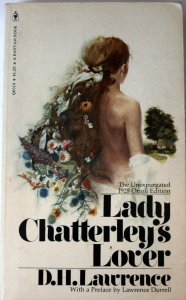As a child, I was wont to explore the family library and one of the first dictionary look-ups I can recall was the word “unexpurgated.” Likely from a cover like this:
And thus I learned that editors at some level were interceding between author and reader, removing text or replacing it with grawlix (#$*)&^@) or G——, G—–n, G*ddamn, and so forth. The difference being that when the editor removes the offending text entirely, the reader is unaware that a profanity existed, whereas in the second type the reader is challenged to recreate the elided word.
While both types of edits are referred to as “Bowdlerization,” it’s the first that most closely defines the word: cleaning a work by excising offending matter. Today, this can apply to text, recorded speech, and video. So who was this eponymous censor and where did we get the term?
Thomas Bowdler (c. 1719–1785) was a banker and student of medicine whose father, also named Thomas Bowdler, was fond of entertaining his family by reading the works of Shakespeare. Later, Thomas the younger discovered that his father had been skipping over certain sections of the plays he felt unsuitable for household consumption.
For example:
Malvolio: By my life, this is my lady’s hand these be her very C’s, her U’s and her T’s and thus makes she her great P’s. [Twelfth Night: Act 2, Scene 5]
And in time Bowdler came to realize that his father had been possessed of a keen mind able to tidy up Shakespeare on the fly, something the general reader would be unable to accomplish. So Bowdler, in conjunction with his sister Henrietta Maria Bowdler (Harriet) (1750–1830), collaborated to publish an expurgated volume of the bard’s selected plays. It’s worth noting that Henrietta’s efforts were themselves Bowdlerized, given that no woman of careful breeding would have been expected to grasp Shakespeare’s allusions.
The Family Shakespeare was a hit, between 1807 and 1827 being republished five times. No longer would the paterfamilias be embarrassed by a child’s impertinent questioning over such passages as:
Hamlet: Do you think I meant country matters?
Ophelia: I think nothing, my lord. [Hamlet: Act 3, Scene 2]
“W-W-Well…” our hapless father stammers, “if you truncate ‘country’ to the first syllable…” No, no this simply wouldn’t do.
Prince Henry: Fare you well; go.
Exeunt Bardolph and Page
This Doll Tearsheet should be some road. [Henry IV, part 2]
“Daddy, why did he call her a ‘road’?”
Now Dad’s in real trouble.
But Family Shakespeare to the rescue! All passages in reference to Doll Tearsheet have been artfully removed (although Mistress Quickly remains), likewise any conjoined and pesky questions. He also published a cleaned-up version of Edward Gibbon’s The History of the Decline and Fall of the Roman Empire, and a few others. We linguistically salute Bowdler in terms like “the N-word,” “the L-word,” “H, E, double hockey-sticks,” “Oh my gosh,” and “underprivileged,” where words are either removed, alluded to, or replaced with salubrious alternatives.
Still, to hew tightly to the etymology, a Bowdlerized work is one that has the “naughty bits” neatly pared away, leaving only that which would fly safely in mixed company, and cause Mickey Mouse no indigestion.
While much of the above can be read as tongue-in-cheek, today we have apps like Clean Reader, which render books free of vulgarity and spare the gentle reader from a spate upon the fainting couch.



https://en.wikipedia.org/wiki/CleanFlicks
Cleanflix, a Utah company that produced bowlderized versions of Hollywood movies. That didn’t pan out so well for them.
LikeLiked by 1 person
Hahaha! 🙂 Great stuff – thank you!
LikeLiked by 1 person
Is Bowdler pronounced with the MOUTH vowel, as your headline suggests, or with the GOAT vowel as I have always assumed.
LikeLiked by 1 person
I’ve always heard it pronounced [bawdlər] like the ‘ou’ in loud.
LikeLike
Great! enjoyed reading:-)
LikeLike
This is great stuff. Someone mentioned Clean Reader to me and it made me think of cooking chili without spices. Sure, you could eat it bland but where’s the fun and flavor in that? Love the word grawlix. It has great mouth feel (in keeping with my food analogies).
LikeLiked by 1 person
I love this! I think every reader of Shakespeare loves the ruder parts of the plays, though, I’m so glad the Bowdlers’ ideas didn’t really take off. :p
LikeLiked by 1 person
During the late 1960s my father, as a member of the Council for Civil Liberties, was part of a number of campaigns against book banning in Australia. One target of the campaign was over the banning of Philip Roth’s “Portnoy’s Complaint”. This was 1969, and as part of preparations for potential legal action he acquired both the unexpurgated and censored/bowdlerised versions of the book, and gave them to me to read. [As an academic lawyer at Sydney University, I have no idea of the relative risks he was running possessing an illegal import, let alone supplying it to a minor]. I was to be a test case in whether a 15 year old could be somehow corrupted or perverted by reading tales of masturbation. I soon discovered a slight variation in typeface in the censored version, which allowed me to quickly locate the original “offending” text and, “compare and contrast” as school literature exam papers liked us to do in those days.
Happily, Penguin Australia “resisted and had copies printed up in secret and stored in fleets of moving trucks. Several attempts to prosecute Penguin and any bookseller carrying the book failed.” [See https://en.wikipedia.org/wiki/Portnoy%27s_Complaint#Censorship%5D. Meanwhile, if I had been called to give evidence as to the corrupting nature of the book, I would truthfully have said I found the book pretty boring, and reading about it was nothing like the real thing.
LikeLiked by 1 person
Having to read Philip Roth with the racy bits removed would be quite the labor with no payday. Good on your father.
LikeLike